2022年中考英语三大从句重点讲解课件(共有PPT41张)
文档属性
| 名称 | 2022年中考英语三大从句重点讲解课件(共有PPT41张) |  | |
| 格式 | pptx | ||
| 文件大小 | 925.6KB | ||
| 资源类型 | 教案 | ||
| 版本资源 | 通用版 | ||
| 科目 | 英语 | ||
| 更新时间 | 2022-04-12 17:40:57 | ||
图片预览

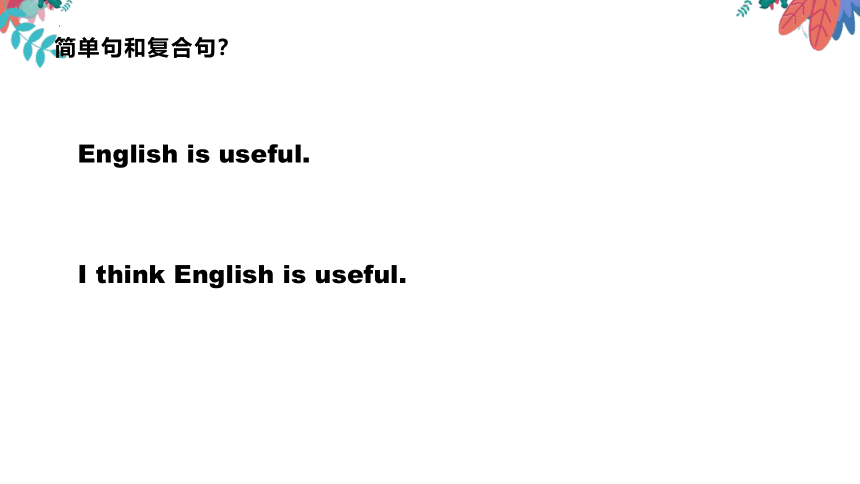
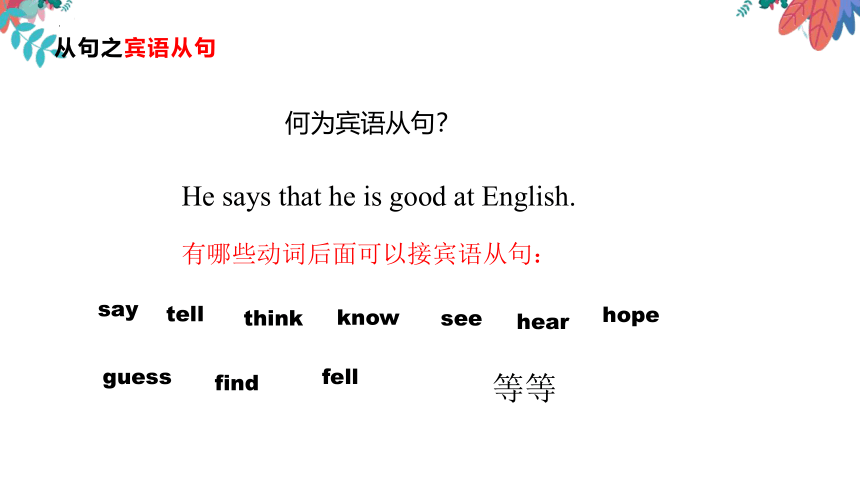
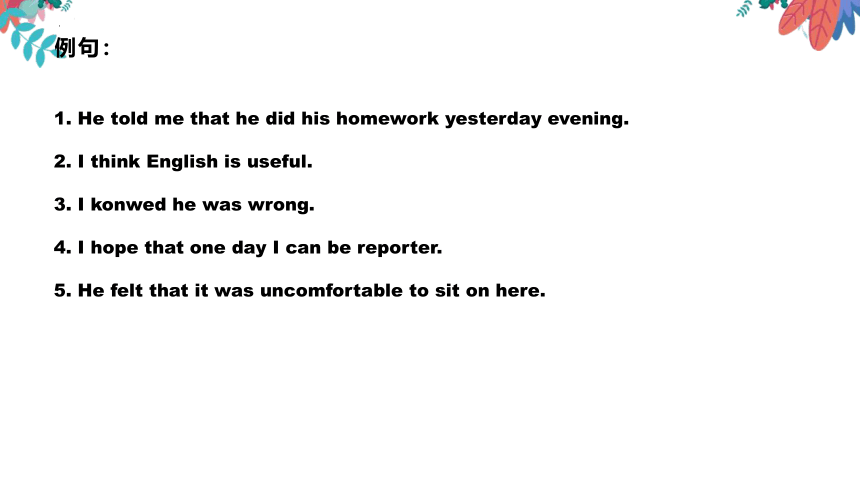
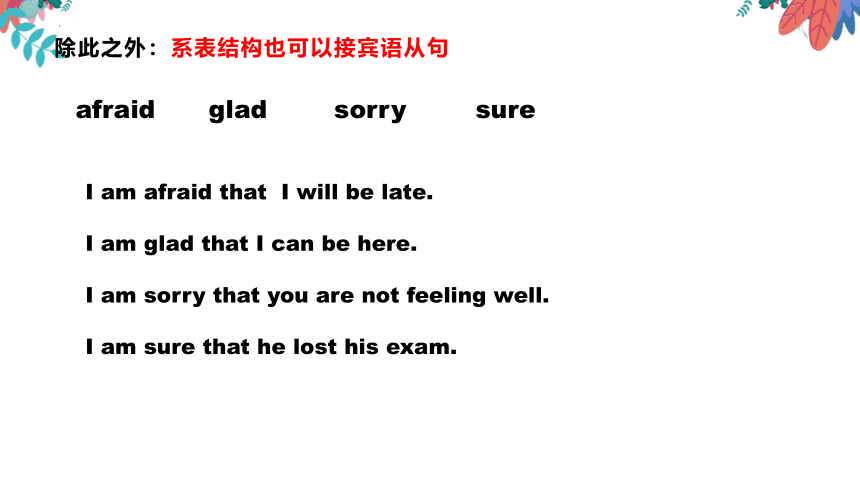
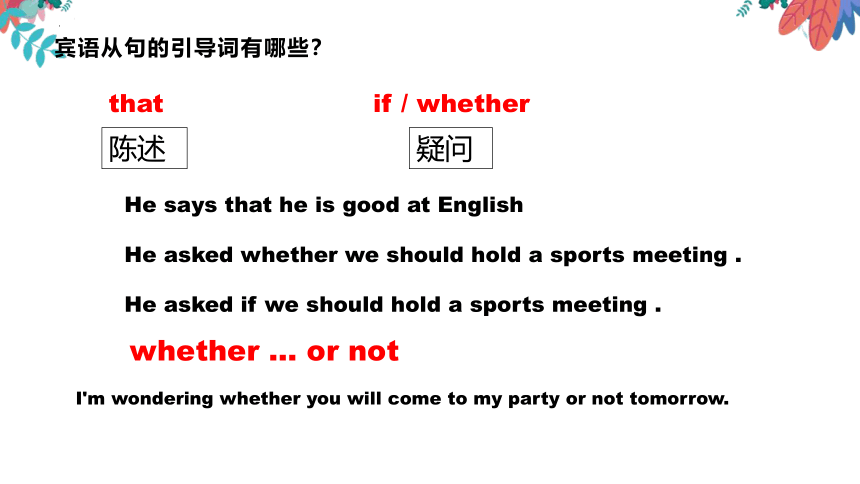

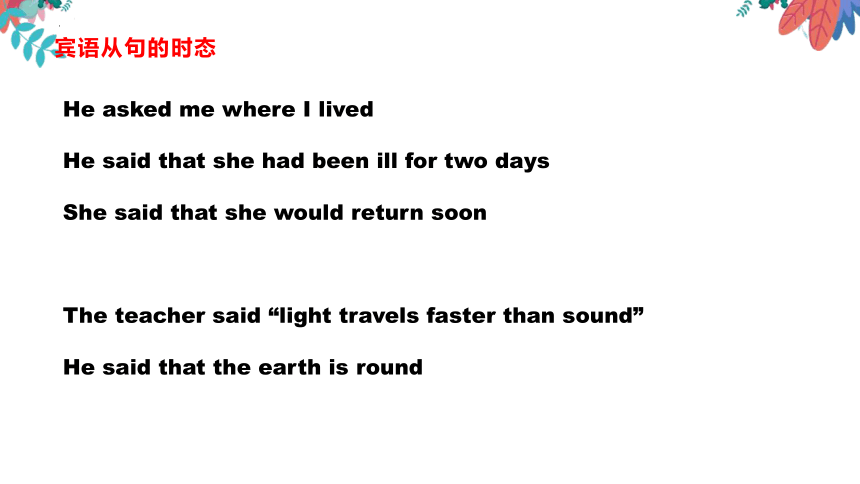
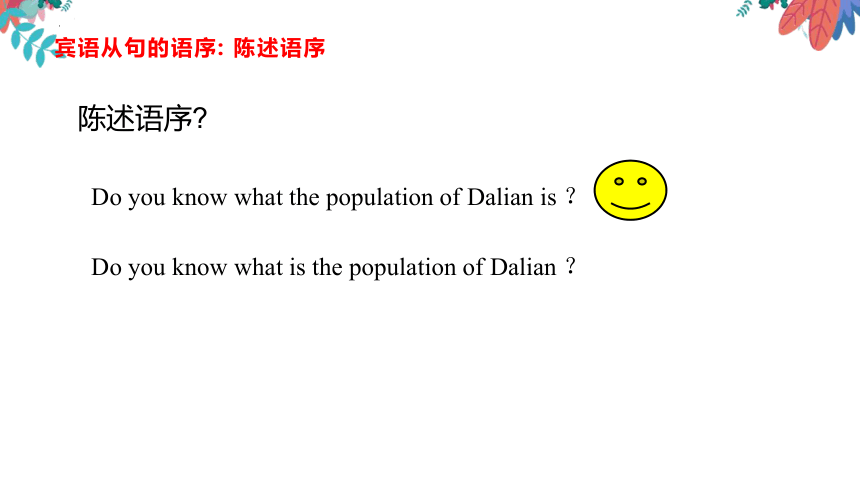
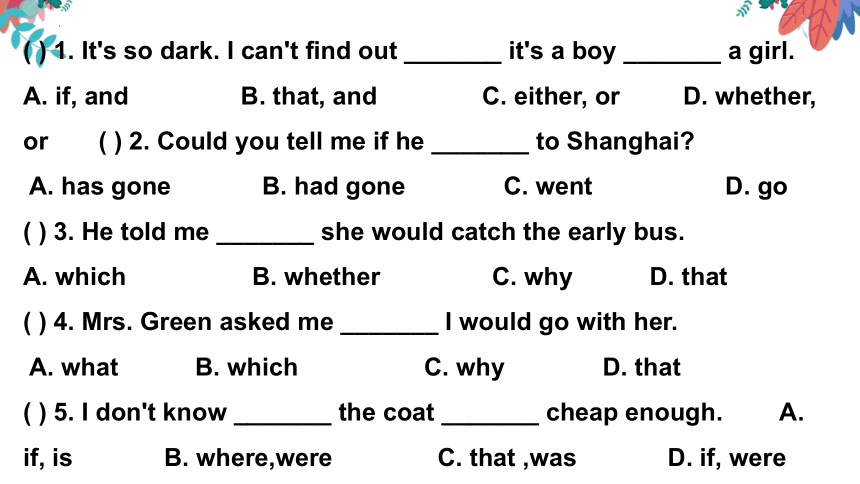
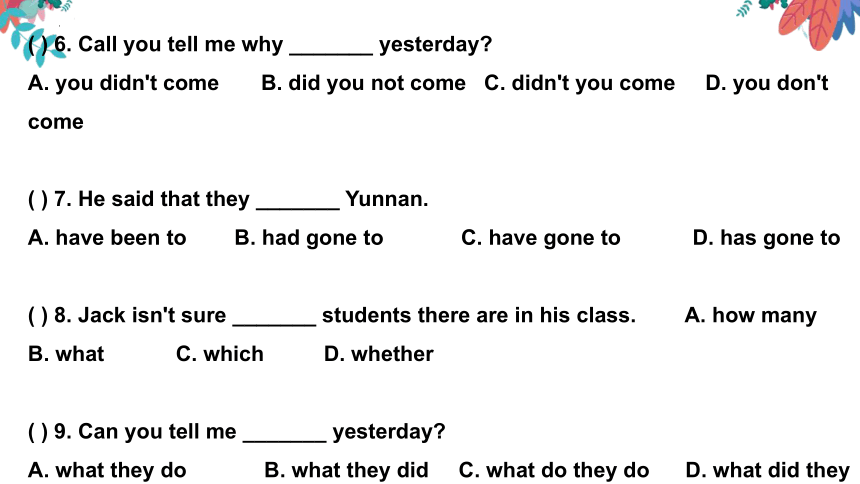

文档简介
(共41张PPT)
初中三大从句重点讲解
宾语从句 | 状语从句| 定语从句
简单句和复合句?
English is useful.
I think English is useful.
从句之宾语从句
何为宾语从句?
He says that he is good at English.
有哪些动词后面可以接宾语从句:
say
tell
think
know
see
hear
hope
guess
find
fell
等等
例句:
1. He told me that he did his homework yesterday evening.
2. I think English is useful.
3. I konwed he was wrong.
4. I hope that one day I can be reporter.
5. He felt that it was uncomfortable to sit on here.
除此之外:系表结构也可以接宾语从句
afraid
sorry
sure
glad
I am afraid that I will be late.
I am glad that I can be here.
I am sorry that you are not feeling well.
I am sure that he lost his exam.
宾语从句的引导词有哪些?
that
if / whether
陈述
疑问
He says that he is good at English
He asked whether we should hold a sports meeting .
He asked if we should hold a sports meeting .
whether ... or not
I'm wondering whether you will come to my party or not tomorrow.
宾语从句的时态
主句用一般现在时, 从句根据需要选择时态
主句用一般过去时,从句用过去的某一种时态
客观真理用一般现在时
He says that he is good at English
He says that he has been ill for two days
I don’t know if he will come tomorrow
宾语从句的时态
He asked me where I lived
He said that she had been ill for two days
She said that she would return soon
The teacher said “light travels faster than sound”
He said that the earth is round
宾语从句的语序: 陈述语序
陈述语序
Do you know what the population of Dalian is ?
Do you know what is the population of Dalian ?
( ) 1. It's so dark. I can't find out _______ it's a boy _______ a girl. A. if, and B. that, and C. either, or D. whether, or ( ) 2. Could you tell me if he _______ to Shanghai
A. has gone B. had gone C. went D. go
( ) 3. He told me _______ she would catch the early bus.
A. which B. whether C. why D. that
( ) 4. Mrs. Green asked me _______ I would go with her.
A. what B. which C. why D. that
( ) 5. I don't know _______ the coat _______ cheap enough. A. if, is B. where,were C. that ,was D. if, were
( ) 6. Call you tell me why _______ yesterday
A. you didn't come B. did you not come C. didn't you come D. you don't come
( ) 7. He said that they _______ Yunnan.
A. have been to B. had gone to C. have gone to D. has gone to
( ) 8. Jack isn't sure _______ students there are in his class. A. how many B. what C. which D. whether
( ) 9. Can you tell me _______ yesterday
A. what they do B. what they did C. what do they do D. what did they do
( ) 10. I want to know _______ his homework yesterday evening.
A. if he finished B. whether he had finished C. had she finished D. has she finished
( ) 11. Do you know what _______ this time yesterday
A. they are doing B. are they doing C. they were doing D. were they doing
( ) 12. Excuse me, can you tell me _______ ?
A. why was the train late B. why the train was late
C. why is the train late D. why the train is late
( ) 13. Do you know where _______ Someone is looking for him.
A. he is B. he was C. is he D. was he
总结:
宾语从句:
定义: 用一个句子做宾语,跟在动词/系表结构后面
引导词: that(无意义,可省略)——陈述
wether/ if (是否)——疑问 ( wether... or not)
时态:1. 主句用一般现在时,从句根据需要选择时态
2. 主句用一般过去时,从句用过去的某一种时态
3. 客观真理用一般现在时
语序: 陈述语序
从句之状语从句
宾语从句作宾语
状语从句作状语
什么是状语?
修饰谓语动词
什么是状语?
他已经走了。
科学终于以伟大的不可抑制的力量战胜了神权
一九四九年,我们国家举行了开国大典
在杭州,我们游览了西湖美景
状态
方式
时间
地点
英语中的状语?
地点
时间
原因
目的
结果
条件
方向
程度
方式
伴随
比如:
He speaks English very well.
I come specially to see you
Ten years ago, She began to live in Dalian
Mozart started writing music when he was four years old.
If it doesn't rain tomorrow, we will go hiking
程度
目的
时间
地点
时间
条件
He speaks English very well.
I come specially to see you
Ten years ago, She began to live in Dalian
Mozart started writing music when he was four years old.
所以状语从句是...
用一句话做状语
状语从句有哪些...
条件状语从句
时间状语从句
原因状语从句
目的状语从句
让步状语从句
比较状语从句
地点状语从句......
状语从句之条件状语从句:
引导词:
if, unless, as(so) long as
时态:
主将从现
I’ll help you with your English if I am free tomorrow.
You won't learn English well unless you work hard.
We'll go as long as the weather is good.
状语从句之时间状语从句
引导词:
when, while,as, before, after, since,
till, (not) until, as soon as
It was raining hard when I got to school yesterday.While he was doing his homework, the telephone rang.
1. 引导词: when和while
when 和while的区别
when一般用: 一般过去时
while一般用: 过去进行时
When he finished his homework,he took a short rest.
While they were talking , the bell rang.
While my wife was reading the newspaper, I was watching TV.
2.引导词:as
一边...一边
随着
The students took notes as they listened.
As years go by,China is getting stronger and richer.
时态:一般过去时
3. 引导词:since 自从
时态: 主句现在完成时
从句一般过去时
I have been missing her since she left.
I have changed my job five times since I was in Shanghai.
4. 引导词until / not...until
He waited until she was about to leave.
I won’t leave until he comes back tomorrow.
5. 引导词as soon as 一... 就...
时态:1. 主句一般将来时
从句一般现在时
He will play football as soon as he finishes his homework.
2. 主句用过去时,从句一般用过去时
As soon as he came back, he turned on the TV.
小节:
条件状语从句
引导词:if(如果), unless(除非), as(so) long as(只要)
时态:主将从现
时间状语从句
引导词
1. when 当...时 从句一般用一般过去时
2. while 当...时 从句一般用过去进行时
3. since 自从 主句现在完成时, 从句一般过去时
4. untill 直到/ not ...untill 直到...才
5. as soon as
(1)主句一般将来时,从句一般现在时
(2)主句一般过去时从句一般过去时
状语从句之原因状语从句
引导词:
because, since,as
He didn’t come to school because he was ill.
Since you are free today, you had better help me with my math.
As it is raining, you should give up your plan.
as 的用法集锦
as 引导时间状语从句:
I read the book as he came back home.
as 引导方式状语从句:
You should do as the book tells you.
as 引导让步状语从句:
Young as he is, he had very much work's experience.
从句之目的状语从句:
引导词:
so that , in order that
He studies hard so that he could work better in the future.
I get up early in order that I can catch the early bus.
in order that 和in order to 的区别:
in order that +从句,
in order to + 动词原形
I get up early in order that I can catch the early bus.
I get up early in order to catch the early bus.
状语从句之 结果状语从句
引导词:
so...that, such...that, so that
Please turn on the light so that I can see what it is.
She felt so sad that tears came to her eyes.
This is such a useful dictionary that I’m thinking of buying it.
so... that 和such...that的区别
so+形容词/副词
such+名词
He spoke so rapidly that we could not clearly understand him.
This book is written in such easy English that beginners can understand it.
状语从句之 让步状语从句
引导词:
though although even if even though
Although/Though he is young, he knows a lot.
Even if it rains tomorrow, we won’t change our plan.
Even though it’s hard work, I enjoy it.
状语从句之 比较状语从句
引导词:
as...as, not as/so.... as
比较级+than
Tom runs faster than John does.
The clouds are as white as snow.
总结
种类 常用连词
时间状语从句 when, as, while, before, after, since, till, (not) until, as soon as
条件状语从句 if, unless, as(so) long as
原因状语从句 because, since, as
目的状语从句 so that, in order that,
结果状语从句 so...that, such...that, so that
让步状语从句 Although, though, even if, even though
比较状语从句 as...as, not as/so.... as
比较级+than
定语从句:
何为定语?
修饰词!
She is a beautiful girl.
The girl who is standing by the window is beautiful.
何为定语从句?
在复合句中,修饰某一名词或代词的从句叫做定语从句!
定语从句是指在一个句子中作定语的句子,定语从句要放在所修饰的词后。
The man who lives next to us is a policeman.
定语所修饰的词
先行词
关系代词
关系副词
关系代词:在从句中充当主语、宾语、定语等成分。
关系副词:在 从句中充当状语。
关系代词引导的定语从句:
1. who 指人,在从句中做主语。
The boys who are playing football are from Class One.
Yesterday I helped an old man who lost his way.
2. whom 指人,在从句中做宾语,可以省略。
Mr. Liu is the person whom you talked about.
练习:
1. Do you know the man __ is talking with your father
A. he B. who C. which D. whom
2.Do you know the man ____ your father is talking with.
A. he B. who c. which D. whom
3. The woman ___ is the most important in my life is my mother.
A. which B. who C. whom D. what
4. Mr. Ling is just the boy ____ I want to see.
A. which B. who C. whom D. what
which 指物,在定从中作主语/宾语,作宾语时可省略
Football match is a game which is liked by most boys.
This ia the pen (which) he bought yesterday.
that 即可指人,也可指物
指人的时候相当于who/whom
指物时相当于 which
that 在从句中做宾语或者主语,做宾语时可以省略
The people that/who come to visit the city are all here.
Where is the man that/ whom I saw this morning.
whose 即可指人,也可指物,在从句中作定语
He has a friend whose father is a doctor.
The classroom whose door is broken will soon be repaired.
Thank You!
初中三大从句重点讲解
宾语从句 | 状语从句| 定语从句
简单句和复合句?
English is useful.
I think English is useful.
从句之宾语从句
何为宾语从句?
He says that he is good at English.
有哪些动词后面可以接宾语从句:
say
tell
think
know
see
hear
hope
guess
find
fell
等等
例句:
1. He told me that he did his homework yesterday evening.
2. I think English is useful.
3. I konwed he was wrong.
4. I hope that one day I can be reporter.
5. He felt that it was uncomfortable to sit on here.
除此之外:系表结构也可以接宾语从句
afraid
sorry
sure
glad
I am afraid that I will be late.
I am glad that I can be here.
I am sorry that you are not feeling well.
I am sure that he lost his exam.
宾语从句的引导词有哪些?
that
if / whether
陈述
疑问
He says that he is good at English
He asked whether we should hold a sports meeting .
He asked if we should hold a sports meeting .
whether ... or not
I'm wondering whether you will come to my party or not tomorrow.
宾语从句的时态
主句用一般现在时, 从句根据需要选择时态
主句用一般过去时,从句用过去的某一种时态
客观真理用一般现在时
He says that he is good at English
He says that he has been ill for two days
I don’t know if he will come tomorrow
宾语从句的时态
He asked me where I lived
He said that she had been ill for two days
She said that she would return soon
The teacher said “light travels faster than sound”
He said that the earth is round
宾语从句的语序: 陈述语序
陈述语序
Do you know what the population of Dalian is ?
Do you know what is the population of Dalian ?
( ) 1. It's so dark. I can't find out _______ it's a boy _______ a girl. A. if, and B. that, and C. either, or D. whether, or ( ) 2. Could you tell me if he _______ to Shanghai
A. has gone B. had gone C. went D. go
( ) 3. He told me _______ she would catch the early bus.
A. which B. whether C. why D. that
( ) 4. Mrs. Green asked me _______ I would go with her.
A. what B. which C. why D. that
( ) 5. I don't know _______ the coat _______ cheap enough. A. if, is B. where,were C. that ,was D. if, were
( ) 6. Call you tell me why _______ yesterday
A. you didn't come B. did you not come C. didn't you come D. you don't come
( ) 7. He said that they _______ Yunnan.
A. have been to B. had gone to C. have gone to D. has gone to
( ) 8. Jack isn't sure _______ students there are in his class. A. how many B. what C. which D. whether
( ) 9. Can you tell me _______ yesterday
A. what they do B. what they did C. what do they do D. what did they do
( ) 10. I want to know _______ his homework yesterday evening.
A. if he finished B. whether he had finished C. had she finished D. has she finished
( ) 11. Do you know what _______ this time yesterday
A. they are doing B. are they doing C. they were doing D. were they doing
( ) 12. Excuse me, can you tell me _______ ?
A. why was the train late B. why the train was late
C. why is the train late D. why the train is late
( ) 13. Do you know where _______ Someone is looking for him.
A. he is B. he was C. is he D. was he
总结:
宾语从句:
定义: 用一个句子做宾语,跟在动词/系表结构后面
引导词: that(无意义,可省略)——陈述
wether/ if (是否)——疑问 ( wether... or not)
时态:1. 主句用一般现在时,从句根据需要选择时态
2. 主句用一般过去时,从句用过去的某一种时态
3. 客观真理用一般现在时
语序: 陈述语序
从句之状语从句
宾语从句作宾语
状语从句作状语
什么是状语?
修饰谓语动词
什么是状语?
他已经走了。
科学终于以伟大的不可抑制的力量战胜了神权
一九四九年,我们国家举行了开国大典
在杭州,我们游览了西湖美景
状态
方式
时间
地点
英语中的状语?
地点
时间
原因
目的
结果
条件
方向
程度
方式
伴随
比如:
He speaks English very well.
I come specially to see you
Ten years ago, She began to live in Dalian
Mozart started writing music when he was four years old.
If it doesn't rain tomorrow, we will go hiking
程度
目的
时间
地点
时间
条件
He speaks English very well.
I come specially to see you
Ten years ago, She began to live in Dalian
Mozart started writing music when he was four years old.
所以状语从句是...
用一句话做状语
状语从句有哪些...
条件状语从句
时间状语从句
原因状语从句
目的状语从句
让步状语从句
比较状语从句
地点状语从句......
状语从句之条件状语从句:
引导词:
if, unless, as(so) long as
时态:
主将从现
I’ll help you with your English if I am free tomorrow.
You won't learn English well unless you work hard.
We'll go as long as the weather is good.
状语从句之时间状语从句
引导词:
when, while,as, before, after, since,
till, (not) until, as soon as
It was raining hard when I got to school yesterday.While he was doing his homework, the telephone rang.
1. 引导词: when和while
when 和while的区别
when一般用: 一般过去时
while一般用: 过去进行时
When he finished his homework,he took a short rest.
While they were talking , the bell rang.
While my wife was reading the newspaper, I was watching TV.
2.引导词:as
一边...一边
随着
The students took notes as they listened.
As years go by,China is getting stronger and richer.
时态:一般过去时
3. 引导词:since 自从
时态: 主句现在完成时
从句一般过去时
I have been missing her since she left.
I have changed my job five times since I was in Shanghai.
4. 引导词until / not...until
He waited until she was about to leave.
I won’t leave until he comes back tomorrow.
5. 引导词as soon as 一... 就...
时态:1. 主句一般将来时
从句一般现在时
He will play football as soon as he finishes his homework.
2. 主句用过去时,从句一般用过去时
As soon as he came back, he turned on the TV.
小节:
条件状语从句
引导词:if(如果), unless(除非), as(so) long as(只要)
时态:主将从现
时间状语从句
引导词
1. when 当...时 从句一般用一般过去时
2. while 当...时 从句一般用过去进行时
3. since 自从 主句现在完成时, 从句一般过去时
4. untill 直到/ not ...untill 直到...才
5. as soon as
(1)主句一般将来时,从句一般现在时
(2)主句一般过去时从句一般过去时
状语从句之原因状语从句
引导词:
because, since,as
He didn’t come to school because he was ill.
Since you are free today, you had better help me with my math.
As it is raining, you should give up your plan.
as 的用法集锦
as 引导时间状语从句:
I read the book as he came back home.
as 引导方式状语从句:
You should do as the book tells you.
as 引导让步状语从句:
Young as he is, he had very much work's experience.
从句之目的状语从句:
引导词:
so that , in order that
He studies hard so that he could work better in the future.
I get up early in order that I can catch the early bus.
in order that 和in order to 的区别:
in order that +从句,
in order to + 动词原形
I get up early in order that I can catch the early bus.
I get up early in order to catch the early bus.
状语从句之 结果状语从句
引导词:
so...that, such...that, so that
Please turn on the light so that I can see what it is.
She felt so sad that tears came to her eyes.
This is such a useful dictionary that I’m thinking of buying it.
so... that 和such...that的区别
so+形容词/副词
such+名词
He spoke so rapidly that we could not clearly understand him.
This book is written in such easy English that beginners can understand it.
状语从句之 让步状语从句
引导词:
though although even if even though
Although/Though he is young, he knows a lot.
Even if it rains tomorrow, we won’t change our plan.
Even though it’s hard work, I enjoy it.
状语从句之 比较状语从句
引导词:
as...as, not as/so.... as
比较级+than
Tom runs faster than John does.
The clouds are as white as snow.
总结
种类 常用连词
时间状语从句 when, as, while, before, after, since, till, (not) until, as soon as
条件状语从句 if, unless, as(so) long as
原因状语从句 because, since, as
目的状语从句 so that, in order that,
结果状语从句 so...that, such...that, so that
让步状语从句 Although, though, even if, even though
比较状语从句 as...as, not as/so.... as
比较级+than
定语从句:
何为定语?
修饰词!
She is a beautiful girl.
The girl who is standing by the window is beautiful.
何为定语从句?
在复合句中,修饰某一名词或代词的从句叫做定语从句!
定语从句是指在一个句子中作定语的句子,定语从句要放在所修饰的词后。
The man who lives next to us is a policeman.
定语所修饰的词
先行词
关系代词
关系副词
关系代词:在从句中充当主语、宾语、定语等成分。
关系副词:在 从句中充当状语。
关系代词引导的定语从句:
1. who 指人,在从句中做主语。
The boys who are playing football are from Class One.
Yesterday I helped an old man who lost his way.
2. whom 指人,在从句中做宾语,可以省略。
Mr. Liu is the person whom you talked about.
练习:
1. Do you know the man __ is talking with your father
A. he B. who C. which D. whom
2.Do you know the man ____ your father is talking with.
A. he B. who c. which D. whom
3. The woman ___ is the most important in my life is my mother.
A. which B. who C. whom D. what
4. Mr. Ling is just the boy ____ I want to see.
A. which B. who C. whom D. what
which 指物,在定从中作主语/宾语,作宾语时可省略
Football match is a game which is liked by most boys.
This ia the pen (which) he bought yesterday.
that 即可指人,也可指物
指人的时候相当于who/whom
指物时相当于 which
that 在从句中做宾语或者主语,做宾语时可以省略
The people that/who come to visit the city are all here.
Where is the man that/ whom I saw this morning.
whose 即可指人,也可指物,在从句中作定语
He has a friend whose father is a doctor.
The classroom whose door is broken will soon be repaired.
Thank You!
同课章节目录
- 词法
- 名词
- 动词和动词短语
- 动词语态
- 动词时态
- 助动词和情态动词
- 非谓语动词
- 冠词
- 代词
- 数词和量词
- 形容词副词及其比较等级
- 介词和介词短语
- 连词和感叹词
- 构词法
- 相似、相近词比较
- 句法
- 陈述句
- 一般疑问句和否定疑问句
- 特殊疑问句及选择疑问句
- 反意疑问句
- 存在句(There be句型)
- 宾语从句
- 定语从句
- 状语从句
- 主谓一致问题
- 简单句
- 并列句
- 复合句
- 主谓一致
- 主、表语从句
- 名词性从句
- 直接引语和间接引语
- 虚拟语气
- 感叹句
- 强调句
- 倒装句
- 祈使句
- 句子的成分
- 句子的分类
- 题型专区
- 单项选择部分
- 易错题
- 完形填空
- 阅读理解
- 词汇练习
- 听说训练
- 句型转换
- 补全对话
- 短文改错
- 翻译
- 书面表达
- 任务型阅读
- 语法填空
- 其他资料
